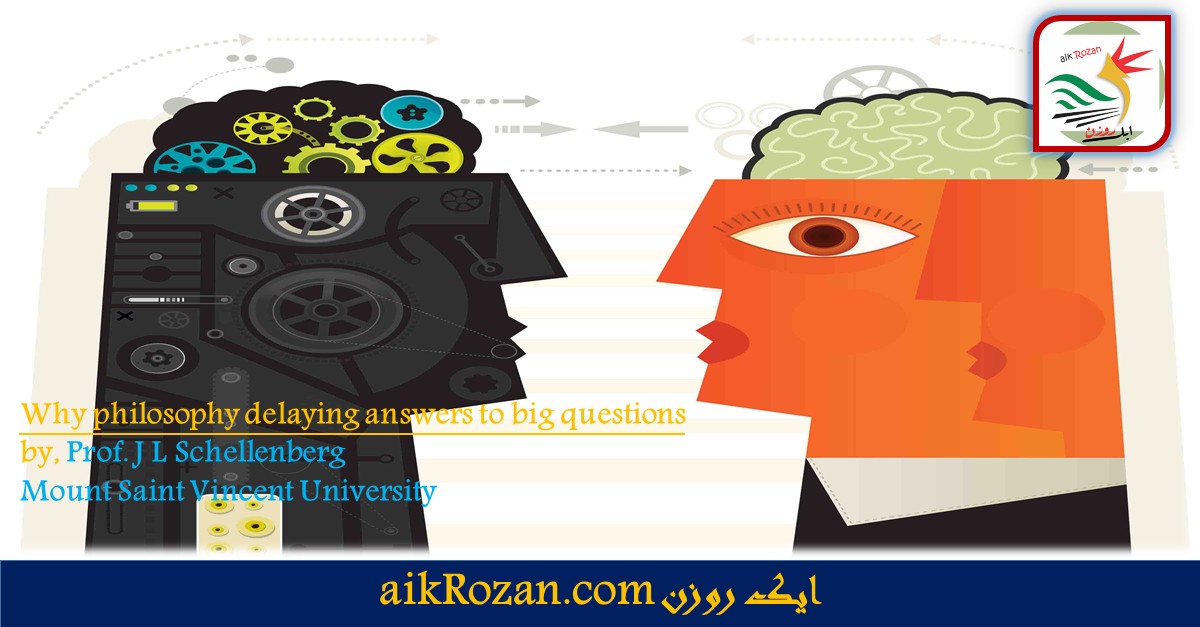
Why philosophy delaying answers to big questions
by, J L Schellenberg
Philosophers periodically fret about the apparent lack of progress in their discipline. The fact that science – always the comparator in these discussions – has been humming along so nicely doesn’t exactly help. By discovering its methods and unifying a lot of us around them, science has figured out how to get human behaviours connected to the larger physical environment in ways that yield information about it, information that we can use to rocket off to the Moon or just bring pleasure to our ever-curious prefrontal cortex. Philosophy, by comparison, seems to have little to brag about.
A number of attempts have recently been made to dispel the fretting. David Papineau, writing in The Times Literary Supplement in June 2017, suggests that philosophy’s problems involve paradoxes so difficult for us to unravel that we should expect its progress to be far less rapid than progress in science. And in Philosophical Progress: In Defence of a Reasonable Optimism (2017), Daniel Stoljar argues that although we return to the same philosophical topics time and again, the questions we ask about those topics change from one time to another, and are progressively being answered.
Such solutions to the problem of philosophy’s progress are well worth considering. But all of them – mine will be another – face fundamental criticisms. Some propose that the whole idea of making progress toward the truth gets philosophy wrong. Rather, philosophy’s job is to help us respond effectively to social and political issues, such as those involving race, gender or inequality, or to deepen the gravitas of our culture, or to help us achieve the examined life. Consider the latter time-honoured goal, for example. If this is what philosophy is for, then it makes progress one person at a time, and can do so even if people successively grapple with much the same questions and answers, with no answers ever designated as the ‘right’ ones.
But can’t philosophy do all of these jobs and be a search for the truth about the Big Questions, as many philosophers – myself included – suppose it to be? Whole ways of doing philosophy would have to be sent packing or provided with a new identity if that were not so. Here it’s good to remember how wide and deep is the curiosity that churns beneath our skulls. As Aristotle says in the first sentence of his Metaphysics, all human beings by nature desire to understand. And it appears that not everything we want to understand is addressed by science. Questions rather different from those of science fill philosophy’s textbooks.
We might now be advised to look at history, which (so it might seem) reveals little continuity in the search for answers to philosophy’s questions of the sort presupposed by the notion of progress. As Carlos Fraenkel observes in his reply to Papineau, also in The Times Literary Supplement, the naturalistic worldview of many contemporary analytical philosophers is rather different from that of the Greeks, preventing what we do from contributing progressively improved enlargements on their themes.
This point is not decisive, however, since joint intellectual concerns – and thus the required continuity – can be discerned by moving to the most general level of investigation. Here we find what Stoljar calls philosophical topics. In an online article, he mentions three of them: ‘the relation between the mind and the body, the scope and nature of human knowledge, the objectivity of morality’. In any case, Ancient Greek philosophy had its own naturalists, the pre-Socratic Atomists. And the idea of the Atomists that reality can be Many as well as One – though a response to ancient notions that we might regard as outlandish, and though it in part leads into modern physics – could easily come up for discussion in a modern course on metaphysics, given the interests and terms of debate currently found in that sub-field of philosophy.
The reference to modern physics reminds us of a commonly cited fact – that philosophy came first and gave birth to science – that could in its own way seem to delegitimise or quickly answer the progress question. Didn’t philosophy lose its truth-related raison d’être after that generous act, having handed the baton to the sciences? Haven’t all the questions in its textbooks gradually migrated into scientific textbooks?
Actually, not so. As David Chalmers points out in a paper that has generated considerable internet discussion, the Big Questions of philosophy tend to stay behind when the sciences leave home. ‘Psychology has not done much to settle the mind-body problem, for example,’ he writes. And plenty of other questions remain for today’s philosophers to try to answer, even after – and indeed because of – the advent of science. Philosophy wants to know if nature, which science explores, is the whole of reality, or whether there’s something more. Tracing, with science, the innumerable causal pathways associated with our behaviours, philosophy wants to know whether these leave room for me to really be free and deserve praise or blame for my behaviour. And if there are truths about how things ought to be as well as scientific truths about how things are, what are they and how are they discovered? Might there be no truths of the former kind at all? In that case, what should we say about morality? Philosophy wants to know.
It is hard to see, therefore, how the urge to make progress with such issues could be ruled out as illegitimate. But philosophers disagree with each other about them all day long – and will do so through the night, too, if you supply the refreshments. Chalmers crisply identifies the result: ‘There has not been large collective convergence to the truth on the big questions of philosophy.’ What should we say about this?
I want to suggest that science can be helpful here in a new way, not by its example but through some of its results. In particular, a new direction of thought is suggested by reflection on large-scale facts involving evolution and deep geological time. Even at the age of about 300,000 years, Homo sapiens is still a young species, and potentially the first of many – whether organic or non-organic – to mull over intellectual problems on our planet. As science itself shows, science and philosophy have hardly drawn their first breath.
This shouldn’t be news. The first outlines of the story were discerned more than 200 years ago. But we’re still adjusting. Sure, having taken a science class or two, we can rattle off geological eras taking us millions of years into the past: Cenozoic, Mesozoic, Palaeozoic. Unlike our ancestors, we don’t think of the world as only a few thousand years old. Nor do we regard the end of days as nearer than the beginning. Although we haven’t thought about it a great deal, we’ll nod knowingly when told that life, maybe including human life, has millions of years left to go – that much of the story of evolution is not yet written. But as it turns out, we human beings are not very good at making our everyday, lived understanding of the place of humans in the world line up with these temporal facts. Just saying ‘millions’ where before we said ‘thousands’ doesn’t mean we’re thinking in the millions.
Part of the problem of course is that scientific timescales resist comprehension. And the future is at a comparative disadvantage if it wants to be known and talked about: we’ve never been there. Perhaps there is also a connection between our macro-level tendencies and what happens at the micro level of individual human lives. Recent psychological studies suggest that most of us, however old or young we might be, are under the illusion that the big important changes in our lives have already happened. (This is even called by a name suggestive of larger things: the End of History Illusion.) Thus, although the future is deep and our past shallow, and in some vague way many of us now know this and might even exult in what the future might bring, we can still get things turned around in our actual behaviour, treating one or another human project as though everything important that will ever happen to move it forward must already have happened.
And this is how we appear to be treating philosophy. Distress about philosophy’s progress on the part of its practitioners seems to stem from the assumption that if we were going to crack the Big Questions assigned to us, we’d have done so by now or be getting close. The Big Answers would loom visibly before us like the great rocks of Stonehenge. Here, the old views about our place in time, which after James Hutton, Charles Lyell and Charles Darwin should indeed be history, are still making themselves felt. Reflection on deep time would instead prod us to think more deeply about whether our very early stage of intellectual development might not also exhibit radical developmental immaturity – and to notice the distinctive and accessible sort of progress that is appropriate to such immaturity.
How should we understand such immaturity? Everyday examples suggest that the notion can be made precise in either or both of two ways. If someone calls you immature, they’re suggesting that you’re undeveloped in some respect. But the sense in which that’s so depends on whether they’re looking into the past, noticing your shortcomings, or looking into the future, acknowledging your potential. The first-year undergraduate who’s distracted from schoolwork by parties and booze, getting less done than might have been expected, betrays immaturity in the first sense. In terms of post-secondary educational attainment, even the hardest-working first-year undergraduate displays immaturity in the second sense. She hasn’t got nearly as far as eventually she will, if she lives on and keeps plugging away. And the two sorts of immaturity, immaturity as shortcoming and immaturity as potential, can be connected in various ways. One might, for example, need to get rid of the former to retain the latter. This is certainly true of the partying first-year undergraduate, when it comes to her educational prospects. Both senses of immaturity can profitably be applied to philosophy.
Here’s an analogy that will help us to see this for immaturity as potential. Suppose I’ve never encountered a piano and am not musically gifted. Though I can still make excellent progress in piano-playing, the progress will be of the particular kind appropriate to a rank beginner. First, of course, I need to lift back the fallboard, notice the keys, and stop pushing or pulling at other parts of the piano. And many other unfit physical behaviours might manifest themselves even after I’ve found the piano’s keys. I’ll have to laboriously unlearn and replace these behaviours. There’ll be much practising at the lower levels, stringing together elementary sounds, before I’m ready to move to higher ones. If I’m a child when starting out, I can make progress of a kind just by waiting: physical maturity, slowly approaching, will allow me to play complicated pieces requiring longer fingers.
Likewise, we might say that good early stage philosophy involves getting acquainted with the distinctive sorts of mental activity and other relevant movements, individual and collective, that philosophy has available to it (finding the keys). It means employing them to develop some basic arguments, thought experiments, distinctions and theories, discovering errors along the way (getting elementary sounds from the keys and correcting elementary mistakes). And it requires doing these things in a multitude of different ways over a considerable period of time (practice, practice, practice).
If what we have so far is right, then we can already notice something interesting: the fretting over philosophy’s progress should stop, since a good deal of what we’ve already done and are doing in the subject is just the ticket for making headway at an early stage. Indeed, the very sort of thing that philosophers who address the progress question will sometimes mention as having been achieved, but find that others regard as underwhelming, is now transformed into striking progress and – not incidentally – further evidence that philosophy is indeed quite immature.
Chalmers notes the discovery of errors: ‘There has been large convergence on various smaller theses: the thesis that knowledge is not justified true belief, for example…. [W]e are especially good at converging on negative theses that rule out certain specific views.’ With Socrates, we appear to be in a preliminary stage of enquiry, in which, quite appropriately, we’re still often discovering what we don’t know.
And where we’ve acquired knowledge, it’s of the modest sort that one would expect at an early stage. Consider Gary Gutting’s emphasis, in his book What Philosophers Know (2009), on the knowledge that philosophers have achieved of distinctions – for example, distinctions between causality and compulsion, knowledge and true opinion, logical and epistemic possibility, and meaning and reference. Some fine elementary piano tunes here! The same goes for our knowledge of some basic options in philosophy. We’ve distinguished and made usable categorical, propositional, quantifier and modal forms of logic. We’ve tried out various methods and approaches – dialectical, transcendental, skeptical, existentialist, phenomenological, analytic and so on. We also have some basic theories, such as decision theory and utilitarianism in ethics, as well as a raft of finely chiselled arguments – all the subject of much obsessively precise discussion that has made them fit to be passed along to those who come after us. Long story short: if we’re early stage philosophers, then excellent progress is occurring right under our noses. It’s only our frame of reference that needs to change.
What’s required is an early stage mental orientation, which will have us thinking of our work as setting up later stages. There might be breakthrough methods and lasting insight on big issues, but at an early stage we certainly can’t expect them. What we should seek are the pioneering dispositions and elementary discoveries, such as important falsehoods and methodological dead ends, that will help us clear the way for more advanced work on the part of philosophers in future generations. This is our responsibility. In early stage philosophy, we don’t really know where we’re going, even while knowing that where others in the future can go will depend on where we end up. Philosophy done under these circumstances is the first act of a drama that is being created on the fly (I owe this image to the philosopher Hud Hudson of Western Washington University).
Here, with respect to the acquisition of an early stage frame of reference, we can’t say that philosophy is already making the progress that’s needed. But it’s not hard to see how it might do so. Indeed, our very inadequacies point the way, by making the second notion of immaturity mentioned earlier, the notion of immaturity as shortcoming, clearly applicable. To realise our potential, at such an early stage, involves getting rid of all the things that still hold us back – such as the inclination to vindicate private certainties, or hunker down in one or another group, speaking mostly to others of like mind and defending our group’s views on the Big Questions against all comers. Our easy assumption of maturity, which these things display, also belongs in this category. What we have here are further errors of thought needing to be discovered and rooted out, and also primitive behaviours, comparable to those habitual movements at the piano that the student must unlearn and replace. These things signal an early stage of development; if we don’t watch out, they could conspire to keep us there.
Of course, even at an early stage of philosophy, we can appropriately form positions based on what the available evidence seems to show. It’s not as though we should just fall silent. Quite the contrary: let babel begin! The right orientation will require bringing our positions into friendly conversation with the positions of disagreeing others in as many human configurations as possible. Disagreement can be made to work for us: its purpose is to expand our imaginations and to enlarge and improve, for everyone, the body of available evidence. Boundaries of race and gender and style must all deliberately be crossed, with the aim of continually increasing the impressiveness of that body, and the power and subtlety of the actions it enables. It is astonishing that anyone should think philosophy could get very far before having done this.
Projects aimed at such things as increasing the number of women’s voices being heard in philosophy, at deeper conversations between Western and non-Western philosophy, and at an improved relationship between analytical and continental philosophy in the West therefore receive a distinctive rationale from philosophy’s immaturity. Even the work of environmentalists and other efforts showing concern for the future of humanity can be roped in here, since the early stages of philosophy will have to be followed by later ones if philosophy is to reach its highest goal. By linking its cart more explicitly to these other aspects of cultural evolution in our time under the banner of fixing shortcomings, philosophy will widen and deepen its body of available evidence, and so make just the sort of progress that we should presently wish to see.
On the conventional view, both science and philosophy are nearing the limit of what they can do, and in terms of how much has actually been achieved, philosophy is far behind. But if human intelligence has miles to go before it sleeps, then, like the child learning piano, philosophy also achieves some of its progress just by waiting – waiting as its empirical database is slowly enriched by science.
In his book Behave: The Biology of Humans at Our Best and Worst (2017), Robert M Sapolsky emphasises the many new links between biology and our social behaviours that have been discovered very recently. Most of the forces by which our behaviours are shaped, he says, ‘involve biology that, not that long ago, we didn’t know existed’. One wonders how much more information we’ll have on such matters in another hundred years, or in a thousand, and what new support for positions (or new positions) on free will or on broader issues in social and political philosophy or in the philosophy of mind will be suggested by it. Similar questions are easily sparked about connections between metaphysics and future physics, between ethics and future work on cultural evolution, or between epistemology and the future of artificial intelligence (AI).
If it is radically immature, then philosophy can afford to wait and see. And the benefit of being willing to wait, of aiming to do philosophy’s most complex and far-reaching work with science’s results in the rearview mirror, is that the activities of science themselves might be regarded as belonging to philosophy’s present progress. Science, on this view, has never left its ancestral home and continues to function as an arm of philosophy. It could at least be persuaded to come home and help out on the weekends.
Of course, either or both of these human projects might yet be transformed in ways that we cannot presently imagine as – with luck – 2,500 years of systematic enquiry turn into 25,000 or 250,000. Even another 250,000 years would take our species only about halfway to the average lifespan of mammal species on our planet.
And maybe we won’t need all that time. In Homo Deus: A Brief History of Tomorrow (2015), Yuval Noah Harari speculates how future versions of AI such as IBM’s Watson or programs developed by Google might give us systems that know us and our problems far better than we do ourselves: ‘As time goes by, the databases will grow, the statistics will become more accurate, the algorithms will improve and the decisions will be even better.’ In the same vein we could imagine, say, a system that in a flash constructs every argument that can be made for the existence of God or the unreality of free will by applying known rules of logical inference (perhaps together with a few plausibility constraints). Who knows how large a leap ahead might thus be made possible? Maybe this mammal will soon devise means of support for its projects enabling philosophical development beyond its years.
But then again, it might not. Though we’re in a hurry, the Universe takes its time. And even Google might not crack the deepest puzzles anytime soon. Whether it does depends entirely on the nature of reality, which we’re certainly in no position to pre-judge. What’s clear is that philosophy has not yet achieved a maturity beyond its years, and that we’ve been held back by not seeing this. When we do see it, we will look for philosophical activities that fit our immature condition, aiming to make a fuller maturity possible down the line. We will consent to be Moses, in hopes that Joshua might one day enter the promised land.
J L Schellenberg is professor of philosophy at Mount Saint Vincent University and adjunct professor of philosophy at Dalhousie University, both in Nova Scotia, Canada. His latest book is The Hiddenness Argument (2015).
This article originally published at aeon.co




